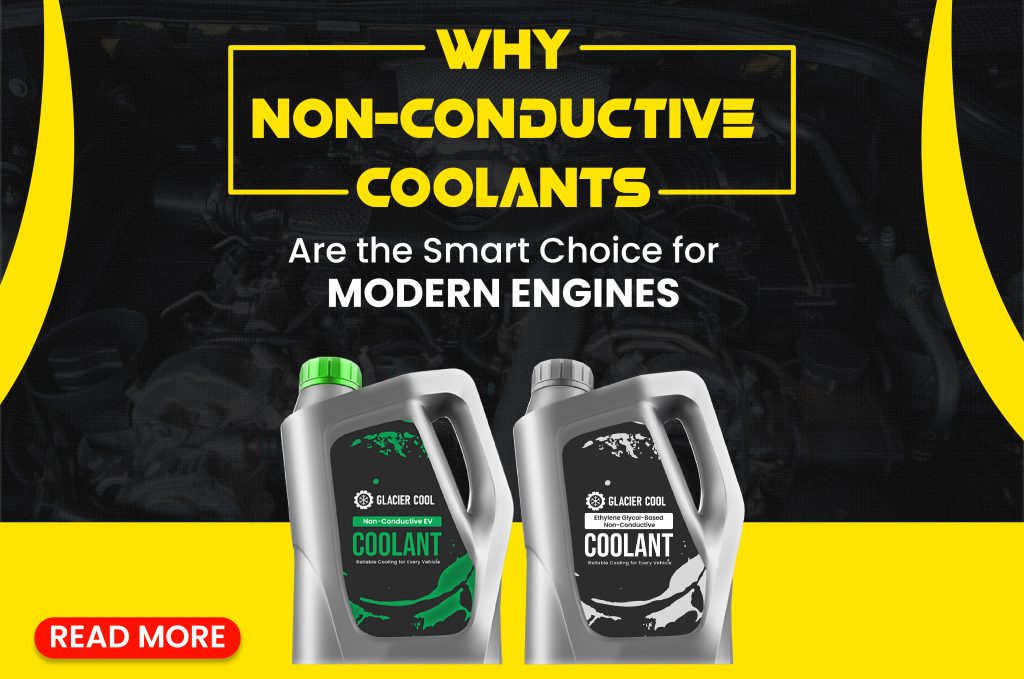The automotive industry now utilizes highly powerful and technologically advanced engines, especially because of the growing electric vehicle (EV) market. Industrial cooling fluids must become more sophisticated because modern automobiles use increasingly advanced engines. Every automobile driver can benefit from implementing non-conductive coolants because they provide safety along with improved performance.
The ability of traditional coolants to manage high temperatures alongside electronics fails in present-day engine systems. Engine cooling performance exceeds traditional functions with specifically engineered coolants that both protect electric systems while enhancing operational safety and engine performance Modern vehicles need coolants that do not transmit electricity because they protect against hot temperatures and sensitive components.
What Makes a Coolant Non-Conductive?
Non-conductive coolants come with specific components that make them resist electricity, while traditional and water-based coolants may carry electrical currents. These coolants possess specific chemical compositions that remove materials and ions responsible for electricity transmission. The wiring system and batteries, along with motors inside EVs, need specific attention because their compact nature makes the components particularly delicate. This protective coating’s function of low electrical conductivity coolants enables heat management to ensure the safety of your electronic devices. The key benefit of non-conductive options becomes clear since manufacturers create them to combine cooling functions with protection features.
Why Are These Coolants Important in EVs?
Electric vehicles have complex high-voltage systems that automatic conductive coolants could detect as stray electrical currents and become hazardous. The use of non-conductive coolants creates a solution to mitigate this particular problem. The insulating nature of these fluids decreases the possibility of electrical failure as well as short circuits. The heating produced by electric vehicle components especially affects batteries.
A non-conductive coolant protects vehicles by carrying away the heat while ensuring the protection of all system components. Such engine coolant systems enable better overall performance with reduced mechanical breakdowns and extended service life of equipment. The neat electrical performance of EVs relies heavily on non-conductive coolant systems.
They Help Prevent Corrosion and Component Damage
Many coolants that conduct electricity also increase the chances of corrosion inside the cooling system, especially when metal and moisture mix. Formulated non-conductive coolants create a protective shield between electrical flows to protect components inside while keeping the flowpaths electrically safe. The protective barrier allows radiator components, along with pumps and heat exchangers, to avoid rusting and developing scale formation. The longevity of both engine coolant systems and protected engine components improves when the products are used over extended periods.
They Support Better Heat Control in All Climates
The electrical safety protection, along with temperature adaptability, distinguishes non-conductive coolants from other fluids. These coolants perform effectively under all weather conditions while managing heat reserves until safe freezing and boiling points occur.
Non-conductive coolants deliver exceptional benefits to high-performance engines alongside vehicles operating in harsh road environments. Stability over time allows these coolants to extend their service period, which reduces both maintenance costs and saves you time during their total lifespan.
They work across gas, diesel, and electric engines
Non-conductive coolants remain adaptable as a primary advantage in their design specifications. The functionality of these coolants extends beyond electric vehicles since they match the performance needs of petrol, diesel, and hybrid engine systems. These coolants adjust easily between commercial trucks and performance sports cars as well as EV systems without compromising any vehicle functionality. Non-conductive coolants represent an advanced solution that meets the requirements of existing and upcoming vehicle models, so they suit the diverse fuel vehicles present in today’s market.
Conclusion
Non-conductive coolants deliver all three benefits, which include superior heat management alongside reduced corrosion and secure electric hazard protection. These products work well in demanding environments and multiple forms of vehicles, which makes them beneficial for motorists who want top-quality engine protection. The evolution of vehicles requires the selection of progressive fluids that combine safety traits and reliability features. Glacier cool coolant systems were developed according to modern needs through their non-conductive cooling method, which ensures operational stability and electrical safety. Make the smart move — consider switching to Glacier Cool for your engine’s future.



